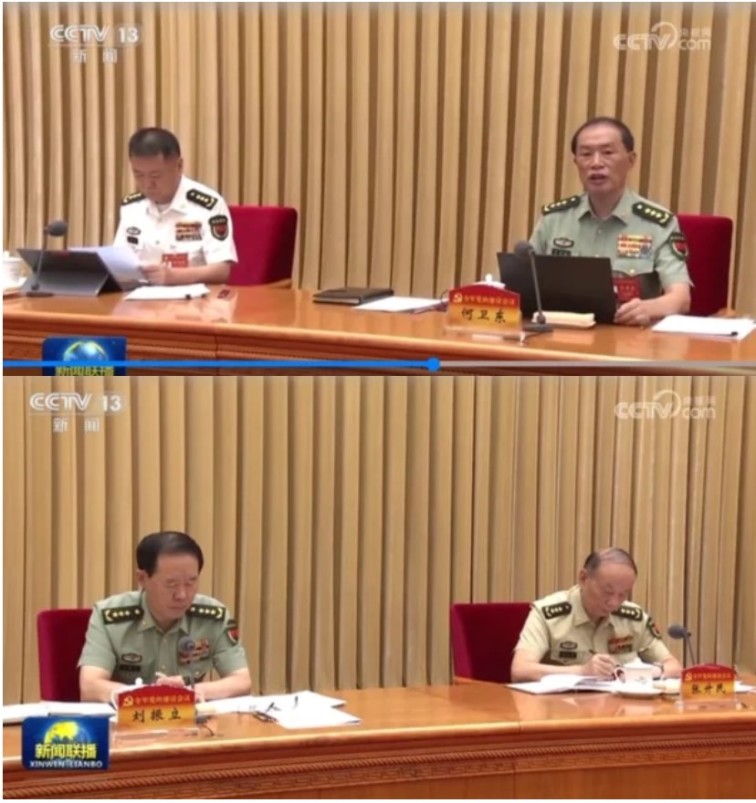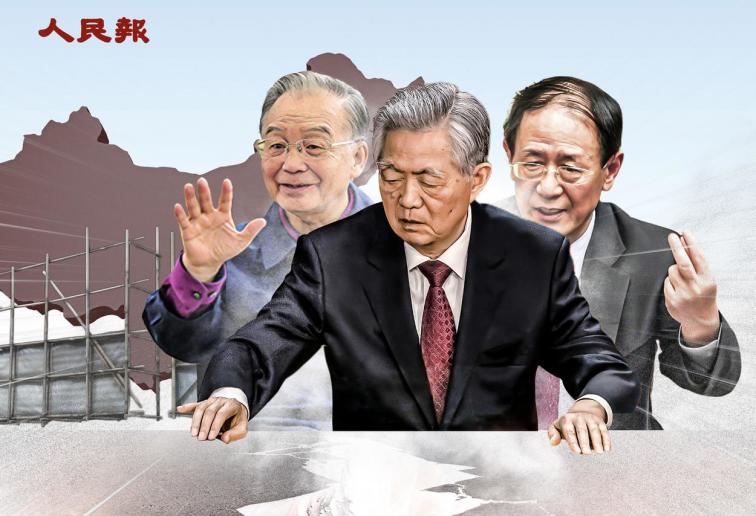In September 1967, Xi Zhongxun was criticised at Northwest Agricultural University (Wikipedia).
[People News] On June 28, the official media of the Communist Party of China reported that the 30th Shanghai Television Festival announced the Bai Yu Lan Awards on the evening of June 27 at the Shanghai Lingang Performing Arts Centre. The TV drama 'My Aletai' won the Bai Yu Lan Award for Best Chinese TV Drama. 'Northwest Years' and 'I Am a Criminal Police Officer' received the Jury's Grand Prize. Actor Jin Dong was awarded Best Actor for his remarkable performance in 'Northwest Years'...
For those who are not familiar with the awarded TV dramas, this news might not seem particularly noteworthy. However, for those within the film industry and those aware of the political intricacies of the Communist Party of China, the oddity of this report is that it completely omits any description of what 'Northwest Years' is about and fails to emphasise the protagonist of the drama. This omission is a clear reflection of the shifting dynamics within the current political landscape of the Communist Party of China.
According to reports, the protagonist of the television drama 'Northwest Years' is Xi Jinping's father, Xi Zhongxun. Born in Fuping County, Shaanxi, Xi Zhongxun became a member of the Communist Party of China (CPC) in 1928. In 1932, following the failed 'Liangdang Mutiny', he co-founded the Shaan-Gan Red Army with Liu Zhidan and Xie Zichang, establishing the Shaan-Gan base area. He later held several key positions, including Chairman of the Soviet Government of the Shaan-Gan Border Area and Secretary of the CPC Guanzhong Special Committee. During the War of Resistance, he served as Secretary of the CPC Guanzhong Branch, Political Commissar of the Guanzhong Military District and the First Guard Brigade, Principal of the CPC Northwest Central Bureau Party School, and Secretary of the CPC Suide Prefectural Committee. During the Chinese Civil War, he was the Secretary of the CPC Northwest Bureau, Political Commissioner of the Shaan-Gan-Ning-Jin-Sui United Defence Army, and Political Commissioner of the Northwest Military Region. The drama portrays Xi Zhongxun's contributions to the CPC during this significant period.
It is noteworthy that this drama is a 'major revolutionary theme television drama' developed under the guidance of the Publicity Department of the CPC and the National Radio and Television Administration. It is also a project supported by the Special Fund for Cultural Industry Development of the Publicity Department for 2024. Key participants in this project include China Central Television, the Propaganda Department of the Shaanxi Provincial Committee of the CPC, Shaanxi Cultural Industry Investment Holding (Group) Co., Ltd., Shenzhen Tencent Computer Systems Co., Ltd., Hunan Happy Sunshine Interactive Entertainment Media Co., Ltd., and Beijing iQIYI Technology Co., Ltd., with production handled by Shaanxi Cultural Industry (Film and Television) Investment Co., Ltd.
Additionally, the project took six years to complete, from planning and scriptwriting to filming. The chief screenwriters are Long Pingping and Xia Meng, the director is Dong Yachun, and the producer is Wang Yong. The lead roles feature Jin Dong as Xi Zhongxun and Ni Ni as his wife, Qi Xin, showcasing a strong cast.
On the evening of November 5 last year, a television drama was broadcast simultaneously on CCTV-1, Tencent Video, iQIYI, and Mango TV, followed by Beijing Satellite TV and Shaanxi Satellite TV. At that time, the Ministry of Propaganda reported that "the drama is set against the backdrop of the magnificent revolutionary struggle history of the Northwest region, telling the story of Xi Zhongxun... as he grows into an outstanding proletarian revolutionary and national leader."
However, several months later, the official media's promotion shifted to state that the drama "tells the stories of Xi Zhongxun and other older generations of proletarian revolutionaries," deliberately downplaying the fact that Xi Zhongxun is the main character. What does this indicate? It suggests that the Chinese Communist Party (CCP) authorities are intentionally minimising the significance of this television drama.
If Xi Jinping were still in power, would a previously emphasised television drama quietly come to an end? Would such a situation arise?
Just a few days ago, overseas self-media reported that, from reliable sources, it was learned that Qi Xin had passed away. However, mainland official media remained silent, neither denying nor issuing any refutation or clarification. In contrast, in 2022, after rumours circulated about Qi Xin's death due to COVID-19, the Guangdong Provincial Committee published a list of condolences, indirectly refuting those rumours. Yet, following the new death, the CCP has not responded at all.
If Xi Jinping were still in power, would such a situation occur?
In fact, the signal to downplay Xi Zhongxun has been evident for some time. According to reports from CCP official media, on May 24, the Guanzhong Revolutionary Memorial Hall was inaugurated, primarily established to commemorate Xi Zhongxun. Notably, the opening day also marks the anniversary of Xi Zhongxun's death in 2002. It is worth mentioning that there were no members of the Xi family among the visitors on that day.
The author previously noted that as early as April 2006, the Communist Party of China established a memorial hall for Xi Zhongxun on the south side of the Xi Zhongxun Cemetery in Dan Village, Fuping County. At that time, the hall covered nearly 1,200 square meters and included a reception room, a screening room, and five exhibition rooms dedicated to showcasing Xi Zhongxun's career. In 2018, following Xi Jinping's elevation to the status of 'the respected one' at the 19th National Congress of the Communist Party, the memorial hall was reconstructed, expanding to nearly 2,000 square meters and now stands as a three-story building. By the end of 2019, the Xi Zhongxun Memorial Hall housed a collection of 363 cultural relics and had been designated as a 'patriotic education base' by Shaanxi Province.
While the Guanzhong Revolutionary Memorial Hall is also located in Fuping, its address is distinctly different, with online sources indicating it is situated in the Zhuangli Experimental Zone of Fuping County. Has the Xi Zhongxun Memorial Hall relocated and been renamed the Guanzhong Revolutionary Memorial Hall? Why was the original name not retained?
If Xi Jinping continues to hold significant power, will such a situation arise?
The answer is a resounding no. It is worth noting that in the second year after Xi assumed leadership of the Communist Party of China (CPC) at the 18th National Congress in 2012, the centenary of Xi Zhongxun's death was commemorated with high-profile events organised by the CPC at both central and local levels. Notably, the commemorations in Gansu and Guangdong were of the highest calibre. Gansu is significant as it was where Xi Zhongxun independently initiated the armed struggle during the so-called 'Liangdang Incident,' while Guangdong was where he was tasked by Deng Xiaoping to 'forge a bloody path' for the CPC's reforms.
Additionally, mainland media either aired documentaries or published articles commemorating Xi Zhongxun, or released collections of his works and albums. The scale of these commemorations clearly exceeded those for other officials of similar rank, a fact that is undoubtedly linked to Xi's prominent status.
Later commemorative events, such as the symposium marking the 80th anniversary of the establishment of the pseudo-government in the Shaanxi-Gansu border area in late September 2014, and the 85th anniversary activities in October 2019, also maintained a relatively high standard. However, the 90th anniversary commemorative activities held in July 2024, following reports of Xi Jinping suffering a stroke and losing military authority, as well as a weakening of his power within the party, showed a marked decline in the scale of participation and the quality of the symposium compared to 2014.
Furthermore, the speeches given by attendees, including those by Xi Yuanping, no longer specifically emphasised Xi Zhongxun. Instead, they referred to CPC members such as Liu Zhidan, Xie Zichang, and Xi Zhongxun, who were instrumental in establishing the pseudo-government, and all expressed their commitment to 'maintain a high degree of consistency' with the Party Central Committee led by Xi.
The signs mentioned above suggest that as Xi Jinping loses power, the treatment of his father, mother, and family has also been impacted. The decline in the treatment of his parents and family further corroborates that Xi's loss of power is genuinely occurring. △
(First published by People News)











News magazine bootstrap themes!
I like this themes, fast loading and look profesional
Thank you Carlos!
You're welcome!
Please support me with give positive rating!
Yes Sure!